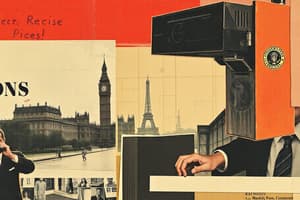Podcast
Questions and Answers
Which constitutional amendment is most closely related to the practice of journalism?
Which constitutional amendment is most closely related to the practice of journalism?
- Eighth Amendment
- Fifth Amendment
- Fourth Amendment
- First Amendment (correct)
Who is considered the 'Father of Journalism'?
Who is considered the 'Father of Journalism'?
- Ernest Hemingway
- Walter Lippmann
- Joseph Pulitzer (correct)
- Edward R. Murrow
What is the primary role of journalists in war and battle?
What is the primary role of journalists in war and battle?
- To provide entertainment for the troops
- To serve as military strategists
- To provide medical aid to wounded soldiers
- To provide objective reporting of events (correct)
What is a major transition in style and medium in the history of journalism?
What is a major transition in style and medium in the history of journalism?
What is the name of the prestigious award considered the 'Pulitzer of broadcasting'?
What is the name of the prestigious award considered the 'Pulitzer of broadcasting'?
Which constitutional amendment is crucial for protecting journalists' right to free speech?
Which constitutional amendment is crucial for protecting journalists' right to free speech?
Who played a significant role in developing the 'yellow journalism' style?
Who played a significant role in developing the 'yellow journalism' style?
What is a primary challenge faced by journalists in war and battle?
What is a primary challenge faced by journalists in war and battle?
Which of the following publications was known for its investigative journalism?
Which of the following publications was known for its investigative journalism?
Which award is considered one of the most prestigious in journalism?
Which award is considered one of the most prestigious in journalism?
What is the primary purpose of the First Amendment in relation to journalism?
What is the primary purpose of the First Amendment in relation to journalism?
Which of the following journalists was known for his in-depth reporting on the Spanish-American War?
Which of the following journalists was known for his in-depth reporting on the Spanish-American War?
What is the primary challenge faced by journalists when reporting on wars and battles?
What is the primary challenge faced by journalists when reporting on wars and battles?
What is the significance of the Peabody Award in journalism?
What is the significance of the Peabody Award in journalism?
What is the primary characteristic of 'yellow journalism'?
What is the primary characteristic of 'yellow journalism'?
What is the primary role of the First Amendment in relation to journalism?
What is the primary role of the First Amendment in relation to journalism?
Which of the following journalists played a significant role in developing the 'muckraking' style of journalism?
Which of the following journalists played a significant role in developing the 'muckraking' style of journalism?
What was the primary impact of the 'yellow journalism' style on the journalism industry?
What was the primary impact of the 'yellow journalism' style on the journalism industry?
Which award is considered one of the most prestigious in journalism, recognizing excellence in newspaper, magazine, and online journalism?
Which award is considered one of the most prestigious in journalism, recognizing excellence in newspaper, magazine, and online journalism?
What is the primary challenge faced by journalists when reporting on wars and battles?
What is the primary challenge faced by journalists when reporting on wars and battles?
Flashcards are hidden until you start studying
Study Notes
The Constitutional Amendments and Journalism
- The First Amendment guarantees freedom of the press, allowing journalists to report without government interference.
- The Fourth Amendment protects journalists from unreasonable searches and seizures.
- The Fifth Amendment ensures journalists' right to remain silent and avoid self-incrimination.
Major Players in Journalism
- Pioneers of Journalism: Joseph Pulitzer (established the Pulitzer Prize) and William Randolph Hearst ( Yellow Journalism pioneer)
- Muckrakers: Ida Tarbell (exposed corporate corruption), Lincoln Steffens (investigated government corruption), and Upton Sinclair (exposed meatpacking industry abuses)
- Investigative Journalists: Bob Woodward and Carl Bernstein (exposed Watergate scandal)
Journalists in War and Battle
- War Correspondents: report from the front lines, providing firsthand accounts of battles and conflicts
- Embedded Journalists: accompany military units to provide in-depth coverage of wars and military operations
History of the Journalism Industry
- Evolution of Print Media: from broadsides to newspapers, magazines, and online publications
- Rise of Electronic Media: radio, television, and online news outlets
- Convergence of Print and Electronic Media: journalists now produce content for multiple platforms
Timelines and Transitions in Journalism
- 19th Century: emergence of yellow journalism and sensationalism
- Early 20th Century: rise of investigative journalism and muckraking
- Mid-20th Century: evolution of broadcast journalism and television news
- Late 20th Century: advent of online journalism and 24-hour news cycles
Journalism Awards and Milestones
- Pulitzer Prize: established in 1917, recognizes excellence in journalism
- Peabody Awards: recognizes excellence in broadcasting and digital media
- National Journalism Awards: honors outstanding journalism in various categories
The Constitutional Amendments and Journalism
- The First Amendment guarantees freedom of the press, allowing journalists to report without government interference.
- The Fourth Amendment protects journalists from unreasonable searches and seizures.
- The Fifth Amendment ensures journalists' right to remain silent and avoid self-incrimination.
Major Players in Journalism
- Pioneers of Journalism: Joseph Pulitzer (established the Pulitzer Prize) and William Randolph Hearst ( Yellow Journalism pioneer)
- Muckrakers: Ida Tarbell (exposed corporate corruption), Lincoln Steffens (investigated government corruption), and Upton Sinclair (exposed meatpacking industry abuses)
- Investigative Journalists: Bob Woodward and Carl Bernstein (exposed Watergate scandal)
Journalists in War and Battle
- War Correspondents: report from the front lines, providing firsthand accounts of battles and conflicts
- Embedded Journalists: accompany military units to provide in-depth coverage of wars and military operations
History of the Journalism Industry
- Evolution of Print Media: from broadsides to newspapers, magazines, and online publications
- Rise of Electronic Media: radio, television, and online news outlets
- Convergence of Print and Electronic Media: journalists now produce content for multiple platforms
Timelines and Transitions in Journalism
- 19th Century: emergence of yellow journalism and sensationalism
- Early 20th Century: rise of investigative journalism and muckraking
- Mid-20th Century: evolution of broadcast journalism and television news
- Late 20th Century: advent of online journalism and 24-hour news cycles
Journalism Awards and Milestones
- Pulitzer Prize: established in 1917, recognizes excellence in journalism
- Peabody Awards: recognizes excellence in broadcasting and digital media
- National Journalism Awards: honors outstanding journalism in various categories
The Constitutional Amendments and Journalism
- The First Amendment guarantees freedom of the press, allowing journalists to report without government interference.
- The Fourth Amendment protects journalists from unreasonable searches and seizures.
- The Fifth Amendment ensures journalists' right to remain silent and avoid self-incrimination.
Major Players in Journalism
- Pioneers of Journalism: Joseph Pulitzer (established the Pulitzer Prize) and William Randolph Hearst ( Yellow Journalism pioneer)
- Muckrakers: Ida Tarbell (exposed corporate corruption), Lincoln Steffens (investigated government corruption), and Upton Sinclair (exposed meatpacking industry abuses)
- Investigative Journalists: Bob Woodward and Carl Bernstein (exposed Watergate scandal)
Journalists in War and Battle
- War Correspondents: report from the front lines, providing firsthand accounts of battles and conflicts
- Embedded Journalists: accompany military units to provide in-depth coverage of wars and military operations
History of the Journalism Industry
- Evolution of Print Media: from broadsides to newspapers, magazines, and online publications
- Rise of Electronic Media: radio, television, and online news outlets
- Convergence of Print and Electronic Media: journalists now produce content for multiple platforms
Timelines and Transitions in Journalism
- 19th Century: emergence of yellow journalism and sensationalism
- Early 20th Century: rise of investigative journalism and muckraking
- Mid-20th Century: evolution of broadcast journalism and television news
- Late 20th Century: advent of online journalism and 24-hour news cycles
Journalism Awards and Milestones
- Pulitzer Prize: established in 1917, recognizes excellence in journalism
- Peabody Awards: recognizes excellence in broadcasting and digital media
- National Journalism Awards: honors outstanding journalism in various categories
The Constitutional Amendments and Journalism
- The First Amendment guarantees freedom of the press, allowing journalists to report without government interference.
- The Fourth Amendment protects journalists from unreasonable searches and seizures.
- The Fifth Amendment ensures journalists' right to remain silent and avoid self-incrimination.
Major Players in Journalism
- Pioneers of Journalism: Joseph Pulitzer (established the Pulitzer Prize) and William Randolph Hearst ( Yellow Journalism pioneer)
- Muckrakers: Ida Tarbell (exposed corporate corruption), Lincoln Steffens (investigated government corruption), and Upton Sinclair (exposed meatpacking industry abuses)
- Investigative Journalists: Bob Woodward and Carl Bernstein (exposed Watergate scandal)
Journalists in War and Battle
- War Correspondents: report from the front lines, providing firsthand accounts of battles and conflicts
- Embedded Journalists: accompany military units to provide in-depth coverage of wars and military operations
History of the Journalism Industry
- Evolution of Print Media: from broadsides to newspapers, magazines, and online publications
- Rise of Electronic Media: radio, television, and online news outlets
- Convergence of Print and Electronic Media: journalists now produce content for multiple platforms
Timelines and Transitions in Journalism
- 19th Century: emergence of yellow journalism and sensationalism
- Early 20th Century: rise of investigative journalism and muckraking
- Mid-20th Century: evolution of broadcast journalism and television news
- Late 20th Century: advent of online journalism and 24-hour news cycles
Journalism Awards and Milestones
- Pulitzer Prize: established in 1917, recognizes excellence in journalism
- Peabody Awards: recognizes excellence in broadcasting and digital media
- National Journalism Awards: honors outstanding journalism in various categories
Studying That Suits You
Use AI to generate personalized quizzes and flashcards to suit your learning preferences.




